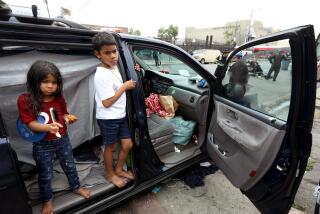Opinion: What it will take to better serve homeless children in Los Angeles schools
- Share via
Recently, I spent some time with two elementary school students, a brother and sister, who have been living with their family in temporary shelter. They were recently evicted after their mom lost her job and their dad was unable to find steady work. They don’t know where they’ll be living next week or next month.
I hear tragic stories like this every day — for instance, of the family of seven living in a 200-square-foot motel room not sure where the next meal will come from, while their children try to do homework and are afraid to leave the room because other dangers are around them. These students live with that trauma every day. They struggle to attend school regularly, not able to concentrate on schoolwork, and have a hard time making friends because they’re changing schools frequently.
Families like these are being helped by a new effort between the Los Angeles Unified School District and the City of Los Angeles to provide housing support to 500 students and their families experiencing homelessness. But it’s not enough.
The official count of students experiencing homelessness in our schools last June was more than 17,000. The real number is probably closer to 25,000 if one were to include families who are afraid to let anyone know because of the stigma their status might bring. Some of the students are in shelters, motels, cars or living with relatives, while others are living unsheltered on the street.
Los Angeles Unified serves about 700,000 students and their families in a diverse set of communities across 710 square miles. Of these families, about 80% live in poverty, one-third more than a generation ago. To put this in dollar terms, in some communities we serve, more than 20% of families have a total household income of less than $15,000 per year. Imagine trying to live on that in Los Angeles.
In addition to housing support, we’re trying to help serve the basic needs of our students. Over the course of a year, we’ll provide mental health counseling to about 30,000 students and medical services to more than 15,000, and we’ll serve more than 115 million free meals to students living in poverty.
But the situation of the young students I met recently is a vivid reminder we need to do more. Schools can be part of the solution if we start doing things differently.
We can better share information among agencies which are serving the same students and families. Schools have a relationship of trust with students and their families experiencing homelessness and have information about their needs. The city and county of Los Angeles can use this information to provide services. We share information with the city and county to serve foster students and need to do the same for students experiencing homelessness.
All the various providers of services should also coordinate their work. Families who need help don’t care which agency it’s coming from. Better collaboration would help scarce dollars go further. Our schools are the centers of the communities they serve, and there is no better place to offer services to students and their families.
Schools need more resources. The state of California provides supplemental funding to schools to help English learners, youth in foster care and those living in poverty, but nothing to help students experiencing homelessness. Schools can do more to help these students, but shouldn’t be expected to take funding away from classroom instruction to do so.
The federal government has to be part of the solution. The Trump administration is proposing to reduce the number of students who are eligible to receive assistance in our schools. As crazy as it sounds, the federal government wants to send less money to schools to help feed children living in poverty. That will only make the situation worse.
The promise of a great education is something we owe to every child. It’s a civil right and the best path out of poverty. That same child needs a safe and stable place to live, regular and healthy meals and access to healthcare to provide a foundation for their education.
As we enter the holiday season and our thoughts turn to helping those most in need, we have to redouble our efforts. Our students and their families are counting on us.
Austin Beutner is the superintendent of the Los Angeles Unified School District.
More to Read
A cure for the common opinion
Get thought-provoking perspectives with our weekly newsletter.
You may occasionally receive promotional content from the Los Angeles Times.










